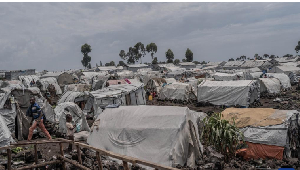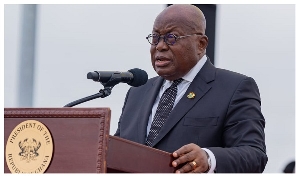Business News of Thursday, 16 October 2008
Source: Ayebia Clarke Publishing
Book and TV Series on Economy to be Launched
Ghana’s contours in development are the theme of a newly published book and television series, An Economic History of Ghana-Reflections on a Half-Century of Challenges and Progress. The 288 page book is edited by Ghanaian author, Ivor Agyeman-Duah (also the producer of the TV series) with a foreword by the Nigerian Nobel laureate, Wole Soyinka. An economic anthology published by Ayebia Clarke of Oxfordshire in the United Kingdom and in the United States by Lynne Rienner distributors, the book would be launched at the La-Palm Royal Beach Hotel in Accra on October 30, 2008 by the former Under-Secretary General of the UN and Executive Secretary of the Economic Commission for Africa, Dr. K.Y. Amoako who also currently heads the Africa Centre for Economic Transformation.
The TV series would be shown on Ghana Television-GTV in the first week of November 2008 and other channels in the United Kingdom and the United States. The book has contributions (conversations with the editor) from twenty distinguished Ghanaian and non-Ghanaian economists, scholars, technocrats and politicians. They include influential economist Jeffrey Sachs of the Earth Institute at Columbia University, Dr Dirk-Jan Omtzigt of Oxford University and formerly lead economist of Adam Smith International in Africa, Dr Gareth Austin , a Reader in Economic History at the London School of Economics. Their Ghanaian counter-parts include, Mary Chinery –Hesse, first woman Deputy Director-General of the International Labour Organization, Prof John Evans Atta Mills, former Vice President of Ghana, Prof Ernest Aryeetey, Director of the Institute of Statistical, Social and Economic Research, Legon, Dr Nii Moi Thompson Executive Director of Development Policy Institute and of the Convention Peoples’, Mr Isaac Osei, CEO of COCOBOD, Ambassador D.K. Osei, Presidential Secretary, Mr Annan Cato, former Cabinet Secretary, Dr Charles Wereko Brobby economist and solar energy engineer, Mr Moses Asaga, fomer NDC Deputy Minister for Finance, Dr Anthony Akoto-Osei, currently Minister of State at the Ministry of Finance, Ms Joyce Aryee, CEO of the Ghana Chamber of Mines, Dr Richard Anane, Minister of Roads and Transport, Dr Ellen Bortei â??Doku Aryeetey, Director of the Center for Social Policy at Legon.
The others are Professor E.Gyimah-Boadi of the Ghana Centre for Democratic Development, Mr. Ken Ofori Atta Executive Chairman of Databank Financial Services, Mr Tony Oteng-Gyasi, President of the Association of Ghana Industries and Dr Gobind Nankani former Vice President for Africa at the World Bank. The book is in three sections- Structures and Institutions in a Post-Colonial Economy, A Vampire Economy with a Silver Lining and Crossing the Jordan: Stimulation in the Economy. According to Mr Agyeman-Duah it brings, “a multi-faceted and disciplinary approach to fundamental issues of Ghana’s economy in the last fifty years by people who have studied it and those who have participated in brining it to where it is now.”
In praise of the book, the former Managing Editor of The Economist and now Rector of Exeter College, Oxford, Frances Cairncross wrote, “Ghana has in recent years been one of Africa’s more successful economies. In this collection of conversations, a wide range of commentators consider the country’s transition in the 50 year journey from colony through Highly Indebted Poor Country to stable democracy. They come from within Ghana and from the ranks of distinguished commentators in the outside world; from academic, political and corporate life. Ivor Agyeman-Duah, who has conducted and edited the contributions, has a sound appreciation of the difficulties of transforming a producer of commodities and raw materials into prosperous mixed economy. The test ahead, as he says in his Introduction, lies in Ghana’s discovery of oil. Will Ghana at last be able to control its own economic destiny, free from obligations to donors and the storms from world commodity markets? This book sets out the problem- and the promise.”










